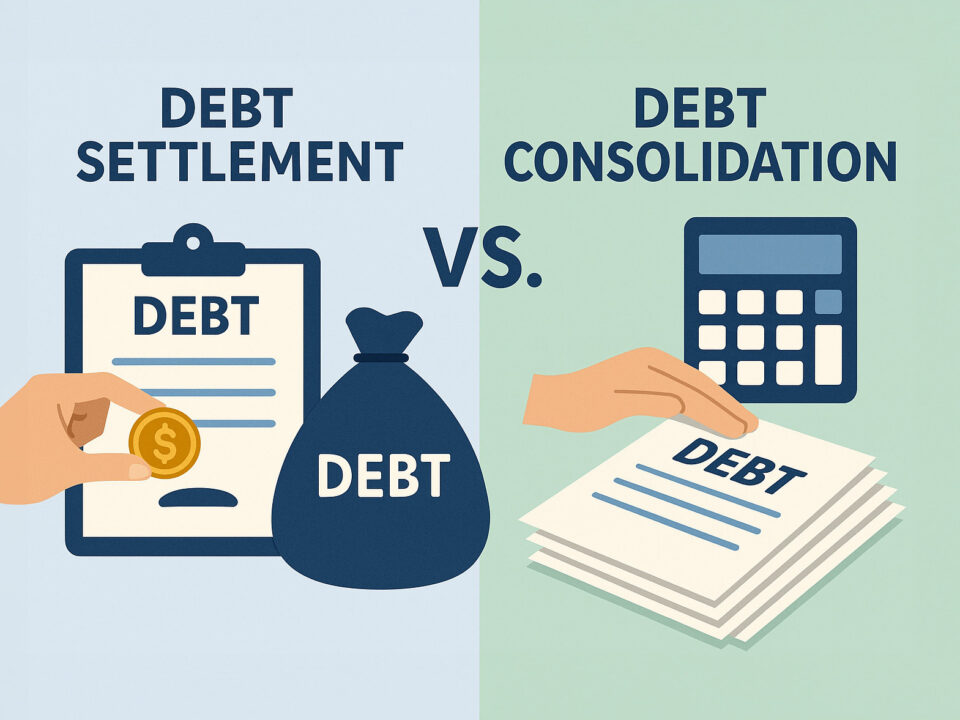
Comprehensive financial planning can be the key to unlocking a future with financial independence and success in 2025. Imagine starting the new year free from the burden of high-interest debt, without the stress that financial uncertainty often brings. For those focused on securing a stable future and embracing a lifestyle dictated by their own choices, the path forward doesn't have to be intimidating. Many are considering how best to manage, save, and invest wisely as they prepare for the future. These are not solo endeavors; practical steps toward a healthier financial future are attainable, and there are insights to be shared.
Consider this a conversation centered around essential strategies designed to turn financial aspirations into realities. The aim is not to encourage overnight transformations but to offer a smarter approach to managing finances. Exploring effective ways to handle debt, plan for retirement, and make decisions that align with long-term goals can set a strong foundation. This isn't about lofty promises but rather simple, clear steps that enable a confident stride toward achieving financial goals. Now, let’s take that first step toward financial success and independence.
Understanding Your Financial Situation and Setting Goals
Analyze Your Current Financial Situation
A clear picture of one's financial landscape is the cornerstone of any comprehensive financial planning. To navigate this journey effectively, it's essential to start by assessing high-interest debt and cash flow management. Begin by listing all existing debts and categorizing them by interest rates. Prioritize tackling high-interest debt, like credit card balances, which can quickly spiral into more significant challenges. This focused approach helps in managing payments efficiently and reduces the overall financial burden.
In addition, a review of cash flow is critical. Understanding where money comes in and where it goes out ensures informed financial decisions. Begin by tracking monthly income against all expenses, identifying patterns that reveal unnecessary spending habits. This practice not only helps in regaining control over finances but also supports future planning. Implementing a budget that reflects personal and financial realities becomes much more straightforward when these aspects are clear.
Staying on track with a comprehensive financial overview is equally vital. Regularly review financial statements and adjust plans as needed. This dynamic financial map lays the groundwork for setting and achieving financial goals. It empowers individuals to establish clear milestones, like increasing savings or decreasing debt, which are aligned with a vision for financial stability and long-term prosperity. By adopting these practices, individuals position themselves favorably in the quest for financial independence and readiness for the future.
Setting Achievable Financial Goals
The pathway to financial stability and growth begins with setting clear, achievable goals. Creating a financial roadmap is essential in guiding everyday decisions and long-term strategies. This roadmap isn't just a list; it's a strategic plan that charts a course from the current financial state toward desired outcomes. Begin by identifying specific, attainable objectives—whether it's paying down debt, building an emergency fund, or saving for retirement—and establish a realistic timeline for each.
Each financial goal should contribute to overall stability and align with personal values and aspirations. For instance, gradually increasing savings contributions or setting aside funds for a significant expense can bring peace of mind, knowing that financial plans are on track. Clarity about what success looks like at various stages not only provides motivation but also creates a framework for measuring progress.
Engaging with a certified financial planner can further enrich this process. These professionals provide personalized advice, tailored to unique financial situations, offering strategies that are aligned with individual goals. Their expertise helps refine priorities and adapt plans as life circumstances change. Navigating financial waters becomes less daunting with such expert guidance, ensuring that plans are not only aspirational but also grounded in financial realities. By setting achievable goals and following a well-defined financial roadmap, individuals can steadily work toward financial independence and long-term success.
The Comprehensive Financial Planning Process Explained
Crafting a Financial Plan Tailored to You
Every individual’s financial journey is unique, and crafting a personalized financial plan is integral to comprehensive financial planning. It's not just about numbers; it's about creating a financial strategy focused on one’s specific needs and aspirations. Start by defining clear objectives—whether it’s achieving a particular savings goal, managing high-interest debt, or investing for future growth. With these objectives in place, align actions that will lead toward reaching them.
A well-crafted financial plan should incorporate both budgeting and cash flow optimization. Budgeting is the backbone of any successful financial strategy, offering a comprehensive view of income versus expenses. It's more than cutting costs; it’s about allocating resources effectively to support life goals. Cash flow optimization ensures that funds are available when needed, enabling smart financial decisions and reducing stress. By consistently reviewing and adjusting budgets, individuals can remain agile and responsive to changing financial situations.
Incorporating Long-Term Financial Security
Long-term financial security is a cornerstone of prudent financial planning. This involves exploring life insurance and long-term care insurance options that protect against unforeseen circumstances. Life insurance serves as a safety net, providing peace of mind that loved ones are financially secure, while long-term care insurance addresses future health care needs. These components provide a foundation of security that supports a stable financial future.
Moreover, safeguarding one’s future through estate planning essentials is crucial. It's about more than wills or trusts; effective estate planning ensures that assets are protected and distributed according to personal wishes. Engaging in estate planning brings clarity and protection to one's financial legacy, reducing potential conflicts and ensuring peace of mind. Incorporating these elements into the comprehensive financial planning process fortifies a financial strategy against uncertainties, paving the way for enduring financial security.
Mastering Debt Management and Financial Decisions

Effective Debt Management Techniques
Addressing high-interest debt is an essential first step in mastering control over personal finances. Utilizing effective debt management strategies can significantly ease the burden of high-interest debt and pave the way for stronger financial health. Begin by listing debts to identify those with the highest interest rates. Prioritize paying off these debts using targeted payments or consolidation options that potentially lower interest rates and monthly payments. This focused approach can save money over time and reduce financial stress.
In tandem with managing debt, making informed financial decisions is crucial for maintaining and enhancing financial health. Consider the impact of financial choices on long-term goals and overall stability. Whether it's deciding on a major purchase, considering investments, or budgeting for essential expenses, each decision should align with a broader financial strategy that supports growth and stability. By staying informed and proactive, individuals can navigate the complexities of financial management with confidence.
Importance of a Professional Financial Advisor
The expertise of a professional financial advisor can be invaluable, especially when dealing with complex financial needs. Consulting with an expert offers insights and strategies that may not be apparent when navigating financial decisions alone. Advisors provide personalized guidance, ensuring that plans are tailored to individual goals, risk tolerance, and current financial circumstances, making a significant difference in outcomes.
An advisor’s role becomes particularly critical in navigating intricate areas such as tax planning and retirement planning. Effective tax planning can reduce liabilities and optimize financial strategies, contributing to overall financial health. Similarly, crafting a robust retirement plan ensures that individuals are prepared for life beyond their working years, securing a stable and comfortable future. Engaging with a financial advisor empowers individuals to make well-informed decisions, leveraging expertise to address challenges and capitalize on opportunities. Through professional guidance, achieving peace of mind and financial clarity becomes an attainable reality.
Building Your Path to Long-Term Financial Health
Retirement Planning for a Secure Future
Planning for retirement is a significant step toward securing a comfortable and worry-free future. To optimize your retirement account, begin with smart planning that aligns with your long-term financial goals. Consider factors such as your expected retirement age, desired lifestyle, and potential healthcare needs. By evaluating these elements, you can determine how much to save and where to invest, ensuring that your retirement strategy is both robust and achievable.
Strategic retirement planning involves making informed decisions about contributions to retirement savings accounts, such as 401(k)s or IRAs. Take advantage of employer matching programs and assess whether the current savings rate aligns with future needs. Diversify your investment portfolio to mitigate risks while aiming for growth. This approach not only secures a stable financial future but also provides peace of mind, knowing that you are well-prepared for life beyond work.
Leveraging Financial Tools to Stay on Track
Staying on course toward financial goals requires the effective use of budgeting tools and regular assessments of your financial planning process. These tools simplify tracking income and expenses, providing insights into spending habits and helping identify areas where adjustments may be needed. By incorporating these tools into daily life, you can make informed choices that support both short-term needs and long-term objectives.
Regularly reviewing your financial strategy is equally important for ensuring it remains relevant and effective. Life circumstances can change, necessitating adjustments to your financial plan. Schedule consistent check-ins to evaluate progress and make necessary updates. This proactive approach ensures that financial strategies continue to align with evolving goals, supporting a trajectory toward long-term health and stability. By leveraging these tools and practices, the journey to financial independence becomes more structured and achievable.
Empowering Informed Decision-Making with Prudent Advice
Educating Yourself on Financial Health
Empowering yourself with knowledge is a fundamental step toward achieving financial independence and security. Staying informed through comprehensive financial education resources enhances the ability to make sound financial decisions and navigate complex financial landscapes. By understanding the essentials of cash flow management, investment strategies, and comprehensive financial planning, individuals can better manage their economic well-being.
Tax planning is a critical component of long-term financial strategies, influencing everything from current budget management to retirement savings. By grasping the significance of tax implications, one can make more informed investment choices and optimize returns. Learning about tax-efficient savings and investments minimizes liabilities and maximizes assets, contributing to overall financial health. With a well-informed perspective, individuals position themselves to take full advantage of financial opportunities.
Aligning Financial Actions with Aspirations
Aligning financial actions with personal aspirations ensures that every decision supports broader life goals. Whether it’s purchasing a home, planning for children’s education, or securing a comfortable retirement, financial decisions made today have long-lasting impacts. Prioritizing goals and making informed decisions helps maintain focus on achieving desired outcomes, fostering both security and satisfaction.
Collaboration with certified financial planners adds strategic depth to this alignment. Their expertise offers tailored strategies and practical solutions that harmonize financial actions with individual goals. Planners provide insights that refine financial plans, making them adaptable enough to accommodate changes and challenges as they arise. By working closely with financial professionals, individuals ensure that their journey toward achieving aspirations is both clear and strategically sound. Each decision, backed by professional guidance, propels them closer to realizing their long-term financial visions.
Your Path to Financial Freedom: Onwards and Upwards
As you step into the future equipped with practical knowledge and strategic insights, comprehensive financial planning serves as your anchor. The journey to financial independence and stability isn’t a sprint; it’s a well-paced marathon shaped by your decisions and goals. By understanding and analyzing your current financial situation, you create a robust foundation for long-term success. Embracing effective debt management and engaging with certified financial planners further adds layers of expertise and personalization, ensuring your plans are not only robust but also adaptable to life’s changes.
Empowerment comes from informed decision-making, supported by continuous education on financial health. Whether it's optimizing your retirement plan, leveraging financial tools, or aligning actions with aspirations, each step you take reinforces your commitment to a brighter financial future. Your goals are attainable, and your aspirations drive your success. By staying informed and involved, you set the stage for lasting financial well-being.
Explore additional resources and expert advice to deepen your understanding and refine your strategies. Trust in the process, and keep your financial independence in sight as a tangible and achievable destination. With Prudent Financial Solutions, your path toward comprehensive and informed financial management is not only possible but within reach. Here’s to your financial journey—paved with informed choices and lifelong success.
FAQs: Your Financial Planning Questions Answered
Q1: What are the first steps I should take when starting comprehensive financial planning?
A: Starting your financial planning journey can be overwhelming, but it begins with understanding your current financial situation and setting clear goals. Assess your income, expenses, and debts to create a detailed picture of your finances. With this foundation, you can begin setting specific, achievable objectives. For guidance tailored to your needs, consider reaching out to Prudent Financial Solutions, where financial experts are ready to assist in crafting a personalized plan.
Q2: How can I manage high-interest debt effectively?
A: Managing high-interest debt involves identifying which debts have the highest rates and focusing on strategies to pay them down. Consolidating debt or creating a repayment plan are effective methods. At Prudent Financial Solutions, we offer a variety of services, including debt management strategies, designed to help you reduce financial burdens and achieve peace of mind.
Q3: Do I really need a professional to help with my financial planning?
A: While it's possible to plan finances independently, a professional can provide invaluable insights and expertise, particularly for complex needs like tax planning or retirement strategies. Prudent Financial Solutions specializes in offering personalized advice that aligns with your unique goals and situations, ensuring you're on the right path toward financial security.
Q4: How can I make sure my financial actions align with my life goals?
A: Aligning financial actions with life goals requires continuous evaluation and informed decision-making. Regularly reviewing your financial plan and adjusting it to reflect life changes or evolving aspirations is crucial. Prudent Financial Solutions can assist you in maintaining alignment by providing expert consultation and strategic adjustments when needed.
Q5: What financial tools can help me stay on track with my budget and savings?
A: There are numerous tools available to help with budgeting and saving, from apps to more traditional methods. Choosing the right one depends on your preferences and needs. Prudent Financial Solutions offers insights into the best tools and practices suitable for your financial situation, ensuring you remain on track to meeting your financial goals.



